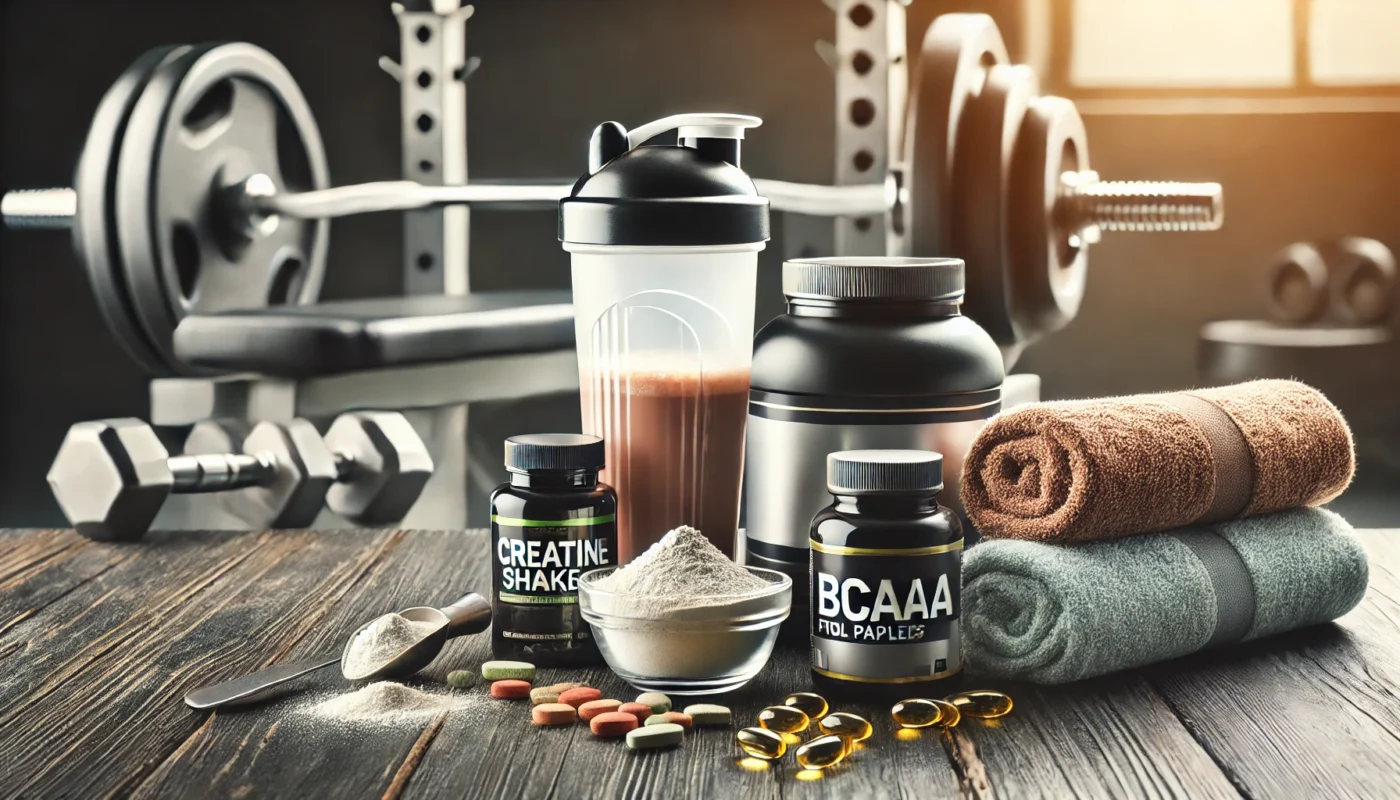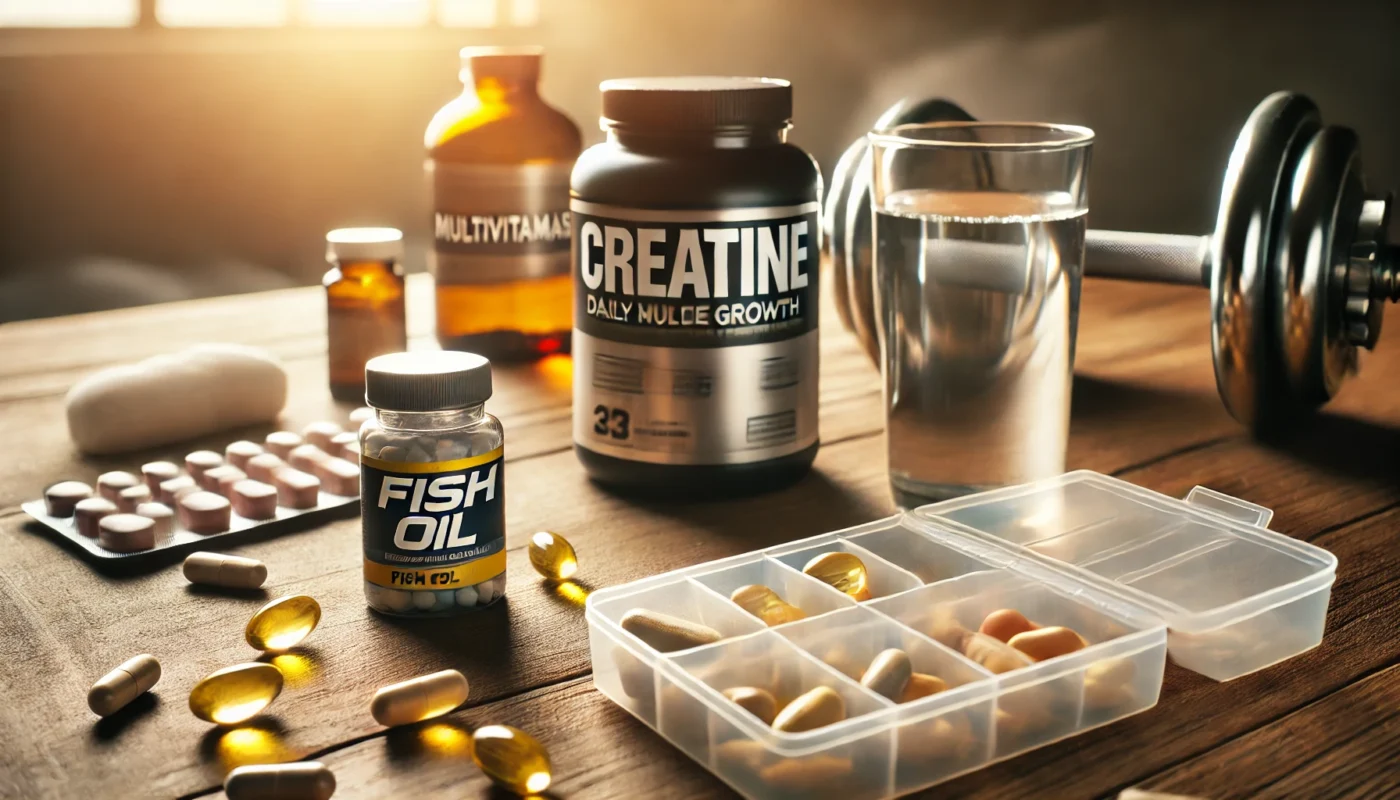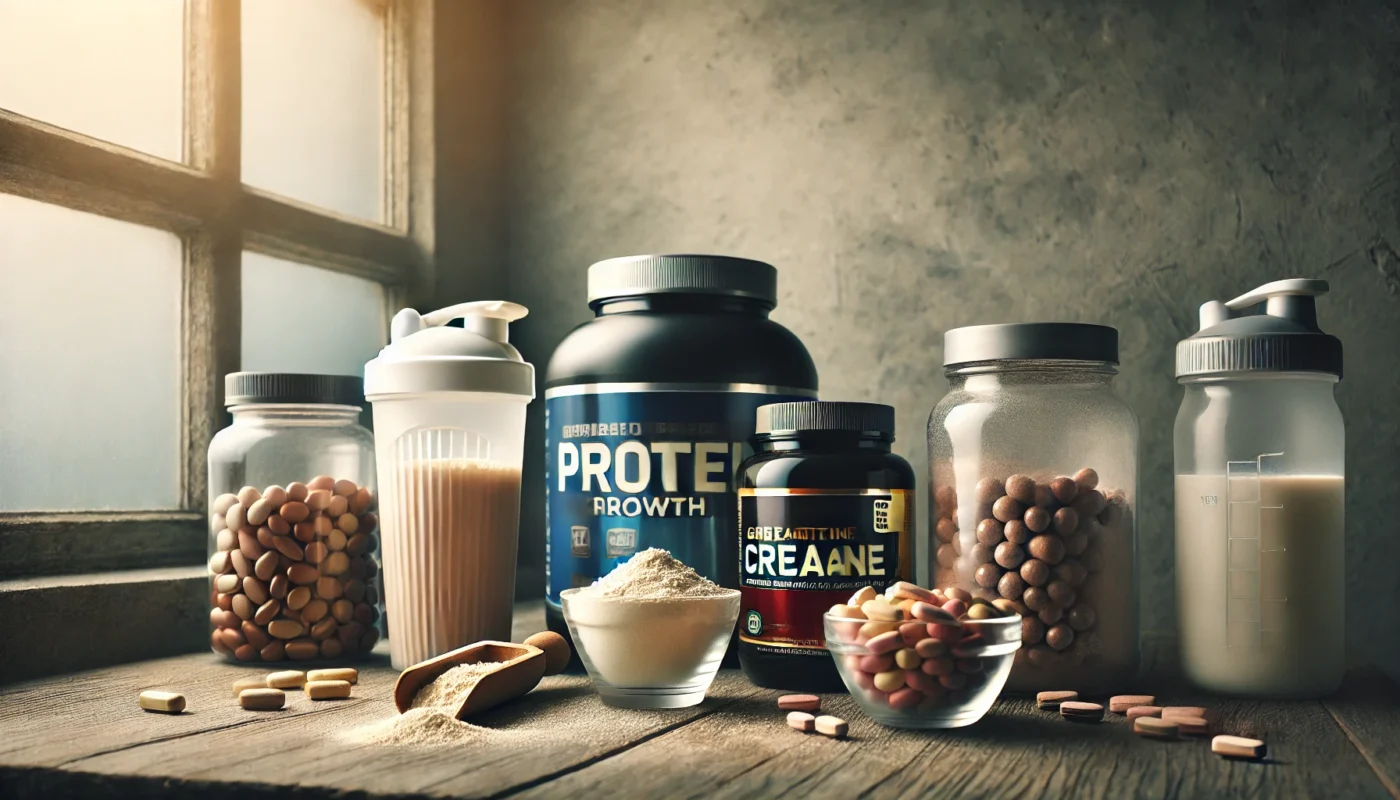In the quest for enhanced muscle growth, supplements have emerged as a powerful ally for fitness enthusiasts and health aficionados alike. With a plethora of options available, deciphering which supplements are truly effective can feel overwhelming. This comprehensive guide aims to demystify the realm of muscle growth supplements, offering insights into the best products and how they can support your fitness journey.
You may also like: High Protein Foods to Fuel Workouts

Understanding Muscle Growth
Muscle growth, scientifically known as hypertrophy, occurs when muscle fibers increase in size. This process is stimulated by physical activity, particularly resistance training, and is supported by nutrition and rest. Supplements can play a pivotal role in maximizing the results of your workouts by providing essential nutrients that may not be consumed in sufficient quantities through diet alone.
The Science Behind Hypertrophy
Hypertrophy is primarily driven by mechanical tension, muscle damage, and metabolic stress. When you lift weights or engage in resistance training, you create micro-tears in your muscle fibers. The body repairs these tears by fusing muscle fibers together, increasing their size and strength. This process relies heavily on protein synthesis, which is where supplements can be particularly beneficial.
The Role of Nutrition in Muscle Growth
While exercise is crucial, nutrition plays an equally important role in muscle development. Consuming a diet rich in protein, carbohydrates, and healthy fats can provide the necessary fuel and building blocks for muscle repair. Supplements can fill in dietary gaps, ensuring you get the right balance of nutrients to support muscle growth.
Rest and Recovery: The Unsung Heroes
Rest is often overlooked but is vital for muscle growth. During rest periods, especially sleep, the body undergoes critical repair and growth processes. Supplements like protein powders and amino acids can support recovery, reducing muscle soreness and promoting faster healing.
The Foundation: Protein Powders
Protein is the cornerstone of muscle repair and growth. It supplies the amino acids required for muscle protein synthesis, the process through which muscles recover and grow post-exercise. Among the myriad of protein supplements available, whey protein stands out due to its high biological value and rapid absorption rate.
Whey Protein
Derived from milk, whey protein is a complete protein, meaning it contains all nine essential amino acids. It is particularly rich in leucine, an amino acid that plays a critical role in muscle protein synthesis. For those seeking an alternative to animal-based proteins, plant-based options like pea or hemp protein are excellent choices, though they may be consumed in slightly larger quantities to match the amino acid profile of whey.
Whey protein is popular due to its versatility and quick absorption, making it ideal for post-workout recovery. It can be consumed in shakes, smoothies, or even baked goods, providing a convenient way to boost protein intake. Additionally, studies have shown that whey protein can help preserve lean muscle mass during weight loss.
Casein Protein
Casein protein, also derived from milk, is another option that digests more slowly, providing a sustained release of amino acids. This makes it an ideal choice for consumption before bedtime to support overnight muscle repair.
The slow digestion of casein protein ensures a prolonged supply of amino acids to muscles, which can be particularly beneficial during long periods without food intake, such as sleep. This characteristic makes casein an excellent choice for those looking to enhance muscle recovery and growth during rest periods.
Plant-Based Protein Alternatives
For individuals following a vegan or vegetarian diet, plant-based protein powders like soy, pea, and hemp offer viable alternatives. These proteins can be just as effective as whey or casein when consumed in appropriate amounts.
Plant-based proteins are often enriched with additional nutrients to improve their amino acid profiles, making them comparable to animal-based proteins. They are also hypoallergenic, making them suitable for those with dairy intolerances or allergies. Incorporating a variety of plant-based proteins can help ensure a balanced intake of essential amino acids.

Beyond Basics: Best Sports Supplements for Building Muscle
Creatine Monohydrate
Creatine is one of the most researched sports supplements and has been shown to enhance strength, increase lean muscle mass, and improve performance in high-intensity exercise. It works by increasing the availability of ATP, the energy currency of the cell, which can enhance strength and reduce fatigue during workouts.
Creatine supplementation can lead to noticeable improvements in muscle size and strength, making it a staple in many athletes’ routines. It is particularly beneficial for short bursts of intense activity, such as weightlifting or sprinting. Additionally, creatine is safe for long-term use when taken as directed.
Branched-Chain Amino Acids (BCAAs)
BCAAs, comprising leucine, isoleucine, and valine, are critical for muscle growth and repair. They are metabolized directly in the muscle and can help reduce muscle soreness, decrease exercise-induced muscle damage, and promote muscle protein synthesis.
BCAAs are particularly useful during prolonged exercise sessions, as they can provide an immediate energy source and reduce muscle breakdown. They are also beneficial for individuals on calorie-restricted diets, helping to preserve lean muscle mass while promoting fat loss. BCAAs can be consumed before, during, or after workouts for optimal results.
Beta-Alanine
Beta-alanine is an amino acid that helps increase carnosine levels in muscles, which can improve endurance and reduce fatigue. This makes it particularly beneficial for high-intensity interval training (HIIT) and resistance training.
By buffering lactic acid build-up, beta-alanine allows athletes to train harder and longer. This supplement is often taken in combination with other performance-enhancing supplements to maximize its effects. Regular use of beta-alanine can lead to improved workout performance and increased muscle mass over time.
Exploring Natural Muscle Builders
For those inclined towards a more holistic approach, natural muscle builders offer compelling alternatives.
Ashwagandha
Ashwagandha is an adaptogenic herb that has been shown to increase muscle mass and strength. It also reduces exercise-induced muscle damage and promotes recovery.
Ashwagandha’s benefits extend beyond muscle growth, as it can also help reduce stress and anxiety, improving overall well-being. This herb supports the body’s ability to handle physical and mental stress, making it a valuable addition to any fitness regimen. Incorporating ashwagandha can lead to enhanced workout performance and recovery.
Rhodiola Rosea
Rhodiola Rosea is another adaptogen known for its ability to reduce fatigue and improve physical performance. It supports the body’s resilience to stress, which can enhance workout performance and recovery.
Rhodiola Rosea has been used for centuries in traditional medicine to boost energy and endurance. Its adaptogenic properties make it effective in reducing the impact of physical and mental stress, allowing for more intense and productive workouts. Regular supplementation can lead to improved stamina and faster recovery times.
Maca Root
Maca root is an ancient Peruvian plant that has gained popularity for its potential to enhance energy and endurance. It is also believed to support hormonal balance, which can be beneficial for muscle growth.
Maca root is rich in essential vitamins and minerals, making it a nutritious addition to any diet. Its energy-boosting properties make it an excellent pre-workout supplement, helping to improve exercise performance and stamina. Additionally, maca may support libido and overall vitality.
What Are the Best Supplements for Building Muscle?
Omega-3 Fatty Acids
Omega-3s, found in fish oil, are known for their anti-inflammatory properties. They can help reduce muscle soreness and support recovery, making them a valuable addition to a muscle-building supplement regimen.
Omega-3 fatty acids play a crucial role in maintaining joint health and reducing inflammation, which can enhance exercise performance and recovery. They are also beneficial for heart health, making them a well-rounded supplement choice for overall wellness. Incorporating omega-3s can lead to improved muscle function and reduced recovery times.
Vitamin D
Vitamin D plays a crucial role in muscle function and strength. Supplementation can be particularly beneficial for individuals with low levels of this nutrient, as it can enhance muscle performance and reduce the risk of injury.
Vitamin D deficiency is common, especially in individuals with limited sun exposure. Ensuring adequate levels of this vitamin can support bone health, immune function, and muscle growth. Regular supplementation can lead to improved strength and reduced risk of fractures or injuries.
L-Glutamine
L-glutamine is an amino acid that supports muscle recovery and immune function. It can be especially helpful during periods of intense training when the immune system may be compromised.
L-glutamine is the most abundant amino acid in the body and plays a vital role in protein synthesis and cellular repair. Supplementing with L-glutamine can help reduce muscle soreness, improve recovery times, and support immune health. It is particularly beneficial for athletes undergoing rigorous training regimens.
Practical Strategies for Supplement Use
While supplements can be incredibly beneficial, they should complement, not replace, a balanced diet and consistent exercise routine. Here are some strategies for optimal supplement use:
Personalization is Key
Understand your unique needs and choose supplements that align with your fitness goals and dietary preferences. Consider factors such as dietary restrictions, workout intensity, and specific muscle-building objectives when selecting supplements.
Consulting with a healthcare professional or nutritionist can provide valuable insights into which supplements are best suited for your individual needs. Personalization ensures that you get the most out of your supplement regimen, maximizing benefits and minimizing potential side effects.
Consistency Matters
Regular use of supplements, as directed, is crucial for seeing results. Sporadic consumption may not yield the desired effects. Establishing a consistent supplement routine can help ensure you receive the full benefits of each product.
Incorporate supplements into your daily routine by setting reminders or integrating them into pre-existing habits. Consistency is key to achieving long-term muscle growth and performance improvements.
Combine with Training
Supplements are most effective when combined with a well-structured training program. They support the hard work done in the gym, rather than acting as a standalone solution.
Pairing supplements with targeted workout plans can enhance their effectiveness, leading to greater muscle gains and performance improvements. Collaborate with a fitness trainer to develop a comprehensive plan that incorporates both exercise and supplementation.
Monitor and Adjust
Keep track of how your body responds to different supplements and adjust your regimen accordingly. Regularly assess your progress and make changes as needed to optimize results.
Listening to your body’s signals can help you identify which supplements are working and which may need adjustment. Keep a journal or use fitness apps to track your supplement intake, workouts, and overall progress. Regular evaluation can lead to more tailored and effective supplementation strategies.

Conclusion
Incorporating the right muscle growth supplements can significantly enhance your fitness journey, helping you achieve your muscle-building goals more efficiently. From protein powders to natural muscle builders, the options are vast and varied. By understanding your body’s needs and selecting high-quality supplements, you can support your muscles in reaching their full potential.
Remember, while supplements can provide a beneficial boost, the foundation of muscle growth remains a balanced diet, consistent exercise, and adequate rest. Prioritize these fundamentals, and let supplements serve as a powerful complement to your efforts.
By approaching supplementation with knowledge and strategy, you’re well-equipped to elevate your muscle growth journey. Here’s to achieving your fitness aspirations with confidence and clarity!
muscle building, supplements, Omega-3, Vitamin D, L-Glutamine, fitness, nutrition, recovery, exercise, strength training, health, dietary supplements, workout, personal training, muscle growth
Further Reading:
Top Muscle Growth Supplements: Expert Recommendations for Best Results
What to know about supplements for muscles
Important Note: The information contained in this article is for general informational purposes only, and should not be construed as health or medical advice, nor is it intended to diagnose, prevent, treat, or cure any disease or health condition. Before embarking on any diet, fitness regimen, or program of nutritional supplementation, it is advisable to consult your healthcare professional in order to determine its safety and probable efficacy in terms of your individual state of health.
Regarding Nutritional Supplements Or Other Non-Prescription Health Products: If any nutritional supplements or other non-prescription health products are mentioned in the foregoing article, any claims or statements made about them have not been evaluated by the U.S. Food and Drug Administration, and such nutritional supplements or other health products are not intended to diagnose, treat, cure, or prevent any disease.

